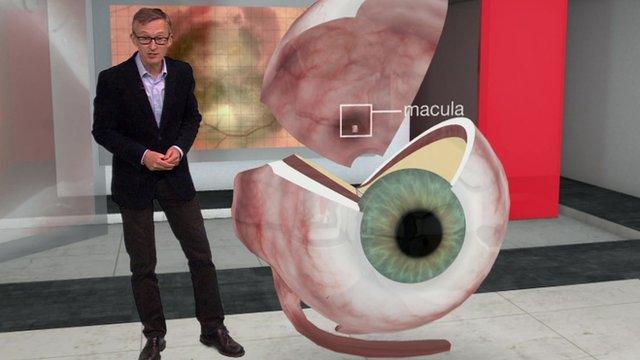Macular degeneration: Link found in eye disease treatment
- Published

Age-related macular degeneration often hits people in their 50s or 60s
Sufferers of a degenerative eye disease have been offered hope after a new link between a protein and the condition was discovered by scientists.
A team from four universities found significantly higher levels of a protein factor in age-related macular degeneration (AMD) patients.
More than 1.5 million people in the UK have AMD, which causes loss of vision.
It is hoped the discovery could lead to earlier diagnoses of the condition and lead to better treatment options.
The research team was made up of scientists from Cardiff University, Queen Mary University of London, the University of Manchester and Radboud University Medical Center in Nijmegen, the Netherlands. They found significantly higher levels of the protein known as FHR-4, external in the blood of AMD patients.
Research then found the presence of the protein in the macular of eye tissue.
The protein regulates the complement system - part of the immune system - and plays a critical role in inflammation in the body.
What causes age-related macular degeneration?
There are two different types of AMD - wet and dry. Some treatment options - including eye injections - exist for wet AMD, which causes vision to deteriorate quickly, but no treatments are available for dry, which happens over a slower period of time.
The condition affects the middle part of people's vision, making reading, watching television and recognising faces difficult.
'Tangible step'
Prof Paul Morgan, an expert in complement biology at Cardiff University, said they had accumulated "a robust body of evidence" that genetically-dictated FHR-4 levels in plasma were an "important predictor of risk of developing AMD."
Prof Simon Clark, a University of Manchester specialist, said: "Up until now, the role played by FHR proteins in disease has only ever been inferred.
"But now we show a direct link and, more excitingly, become a tangible step closer to identifying a group of potential therapeutic targets to treat this debilitating disease."
- Published18 February 2019
- Published19 March 2018

- Published29 September 2015
